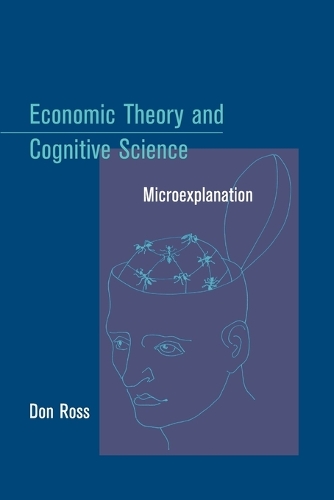
Economic Theory and Cognitive Science: Microexplanation
(Paperback)
Publishing Details
Economic Theory and Cognitive Science: Microexplanation
By (Author) Don Ross
MIT Press Ltd
Bradford Books
26th January 2007
United States
Classifications
Professional and Scholarly
Non Fiction
Cognition and cognitive psychology
330.1
Physical Properties
Paperback
454
Width 152mm, Height 229mm, Spine 19mm
612g
Description
In this study, Don Ross explores the relationship of economics to other branches of behavioral science, asking, in the course of his analysis, under what interpretation economics is a sound empirical science. The book explores the relationships between economic theory and the theoretical foundations of related disciplines that are relevant to the day-to-day work of economics-the cognitive and behavioral sciences. It asks whether the increasingly sophisticated techniques of microeconomic analysis have revealed any deep empirical regularities-whether technical improvement represents improvement in any other sense. Casting Daniel Dennett and Kenneth Binmore as its intellectual heroes, the book proposes a comprehensive model of economic theory that, Ross argues, does not supplant, but recovers the core neoclassical insights, and counters the caricaturish conception of neoclassicism so derided by advocates of behavioral or evolutionary economics.Because he approaches his topic from the viewpoint of the philosophy of science, Ross devotes one chapter to the philosophical theory and terminology on which his argument depends and another to related philosophical issues. Two chapters provide the theoretical background in economics, one covering developments in neoclassical microeconomics and the other treating behavioral and experimental economics and evolutionary game theory. The three chapters at the heart of the argument then apply theses from the philosophy of cognitive science to foundational problems for economic theory. In these chapters, economists will find a genuinely new way of thinking about the implications of cognitive science for economics, and cognitive scientists will find in economic behavior, a new testing site for the explanations of cognitive science.
Reviews
"Economists and cognitive scientists have been on a random walk towards one another for two decades now. But it took Don Ross's book to reveal the straight line that joins these two disciplines and make out of them a social science with all the mathematical beauty of general equilibrium theory and the empirical content of a behavioral science. I doubt that either an economist or a psychologist could have found the path to this stable equilibrium around which to organize both disciplines. It required someone well versed in both the history of economics and decision theory, a combination that only Ross combines. The result is the most important new work in the philosophy of economics in years!"--Alex Rosenberg, R. Taylor Cole Professor of Philosophy, Duke University "The current state-of-the-art in a number of subdisciplines of cognitive science and economics makes questions of integration and cross-border relations more urgent and difficult than usual. Ross's ambitious, wide-ranging, richly detailed, up-to-date, and carefully argued approach to unifying and organizing the behavioral sciences is therefore especially timely. It is a major contribution to our understanding of those sciences, and an important advance in the philosophy of science as well." David Spurrett , University of KwaZulu-Natal, South Africa "The current state of the art in a number of subdisciplines of cognitive science and economics makes questions of integration and cross-border relations more urgent and difficult than usual. Ross's ambitious, wide-ranging, richly detailed, up-to-date, and carefully argued approach to unifying and organizing the behavioral sciences is therefore especially timely. It is a major contribution to our understanding of those sciences, and an important advance in the philosophy of science as well."--David Spurrett, University of KwaZulu-Natal, South Africa
Author Bio
Don Ross is Professor of Economics and Dean of Commerce at the University of Cape Town, and Research Fellow in the Center for Economic Analysis of Risk at Georgia State University. He is the author of Economic Theory and Cognitive Science- Microexplanation (MIT Press, 2005), companion volume to Midbrain Mutiny.
